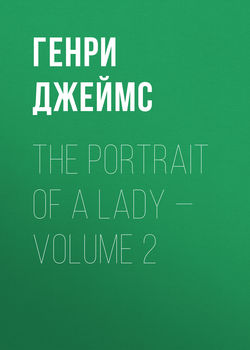The Portrait of a Lady — Volume 2

Реклама. ООО «ЛитРес», ИНН: 7719571260.
Оглавление
Генри Джеймс. The Portrait of a Lady — Volume 2
CHAPTER XXVIII
CHAPTER XXIX
CHAPTER XXX
CHAPTER XXXI
CHAPTER XXXII
CHAPTER XXXIII
CHAPTER XXXIV
CHAPTER XXXV
CHAPTER XXXVI
CHAPTER XXXVII
CHAPTER XXXVIII
CHAPTER XXXIX
CHAPTER XL
CHAPTER XLI
CHAPTER XLII
CHAPTER XLIII
CHAPTER XLIV
CHAPTER XLV
CHAPTER XLVI
CHAPTER XLVII
CHAPTER XLVIII
CHAPTER XLIX
CHAPTER L
CHAPTER LI
CHAPTER LII
CHAPTER LIII
CHAPTER LIV
CHAPTER LV
Отрывок из книги
Ralph Touchett, in talk with his excellent friend, had rather markedly qualified, as we know, his recognition of Gilbert Osmond’s personal merits; but he might really have felt himself illiberal in the light of that gentleman’s conduct during the rest of the visit to Rome. Osmond spent a portion of each day with Isabel and her companions, and ended by affecting them as the easiest of men to live with. Who wouldn’t have seen that he could command, as it were, both tact and gaiety?—which perhaps was exactly why Ralph had made his old-time look of superficial sociability a reproach to him. Even Isabel’s invidious kinsman was obliged to admit that he was just now a delightful associate. His good humour was imperturbable, his knowledge of the right fact, his production of the right word, as convenient as the friendly flicker of a match for your cigarette. Clearly he was amused—as amused as a man could be who was so little ever surprised, and that made him almost applausive. It was not that his spirits were visibly high—he would never, in the concert of pleasure, touch the big drum by so much as a knuckle: he had a mortal dislike to the high, ragged note, to what he called random ravings. He thought Miss Archer sometimes of too precipitate a readiness. It was pity she had that fault, because if she had not had it she would really have had none; she would have been as smooth to his general need of her as handled ivory to the palm. If he was not personally loud, however, he was deep, and during these closing days of the Roman May he knew a complacency that matched with slow irregular walks under the pines of the Villa Borghese, among the small sweet meadow-flowers and the mossy marbles. He was pleased with everything; he had never before been pleased with so many things at once. Old impressions, old enjoyments, renewed themselves; one evening, going home to his room at the inn, he wrote down a little sonnet to which he prefixed the title of “Rome Revisited.” A day or two later he showed this piece of correct and ingenious verse to Isabel, explaining to her that it was an Italian fashion to commemorate the occasions of life by a tribute to the muse.
He took his pleasures in general singly; he was too often—he would have admitted that—too sorely aware of something wrong, something ugly; the fertilising dew of a conceivable felicity too seldom descended on his spirit. But at present he was happy—happier than he had perhaps ever been in his life, and the feeling had a large foundation. This was simply the sense of success—the most agreeable emotion of the human heart. Osmond had never had too much of it; in this respect he had the irritation of satiety, as he knew perfectly well and often reminded himself. “Ah no, I’ve not been spoiled; certainly I’ve not been spoiled,” he used inwardly to repeat. “If I do succeed before I die I shall thoroughly have earned it.” He was too apt to reason as if “earning” this boon consisted above all of covertly aching for it and might be confined to that exercise. Absolutely void of it, also, his career had not been; he might indeed have suggested to a spectator here and there that he was resting on vague laurels. But his triumphs were, some of them, now too old; others had been too easy. The present one had been less arduous than might have been expected, but had been easy—that is had been rapid—only because he had made an altogether exceptional effort, a greater effort than he had believed it in him to make. The desire to have something or other to show for his “parts”—to show somehow or other—had been the dream of his youth; but as the years went on the conditions attached to any marked proof of rarity had affected him more and more as gross and detestable; like the swallowing of mugs of beer to advertise what one could “stand.” If an anonymous drawing on a museum wall had been conscious and watchful it might have known this peculiar pleasure of being at last and all of a sudden identified—as from the hand of a great master—by the so high and so unnoticed fact of style. His “style” was what the girl had discovered with a little help; and now, beside herself enjoying it, she should publish it to the world without his having any of the trouble. She should do the thing for him, and he would not have waited in vain.
.....
“No, no,” she emphatically answered—“there you’re not sincere. You’re not easy to know; no one could be less so.”
“Well,” he laughed, “I said that because I know myself. It may be a boast, but I do.”
.....